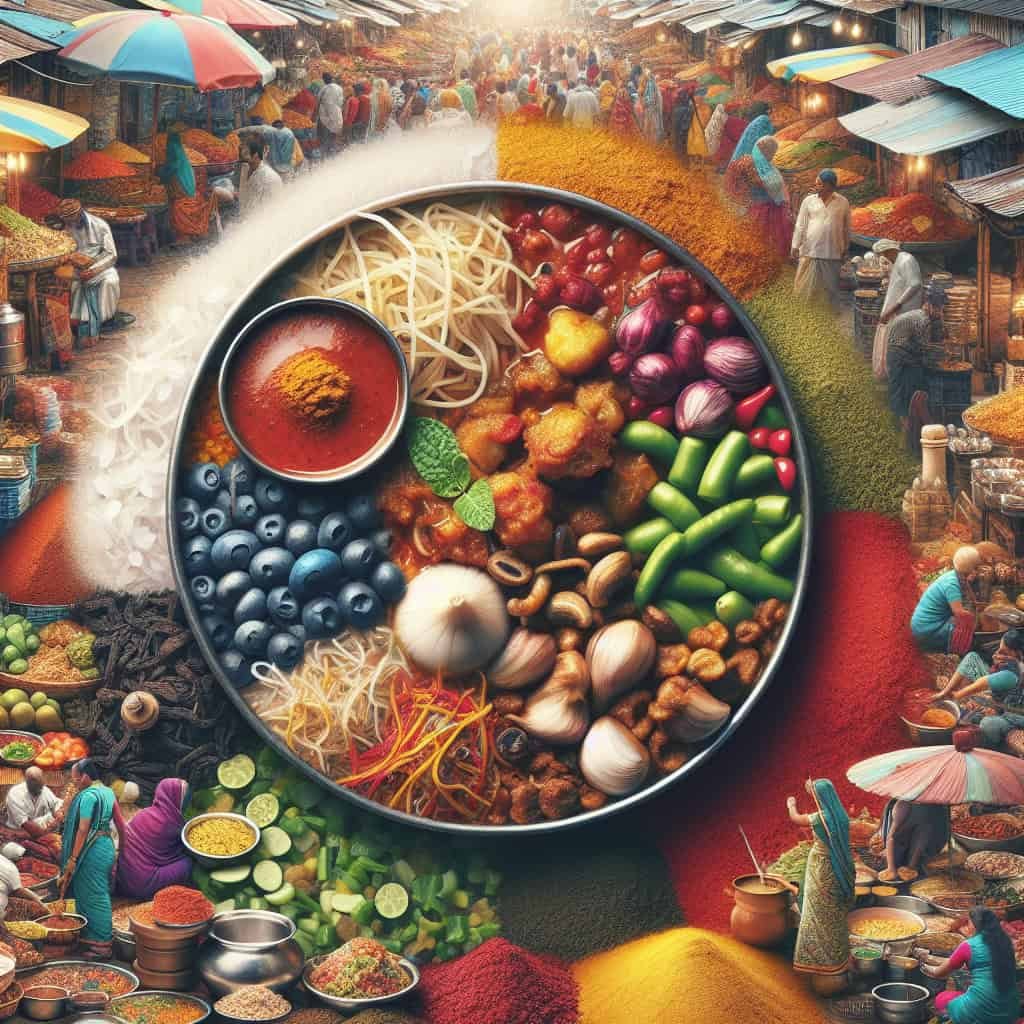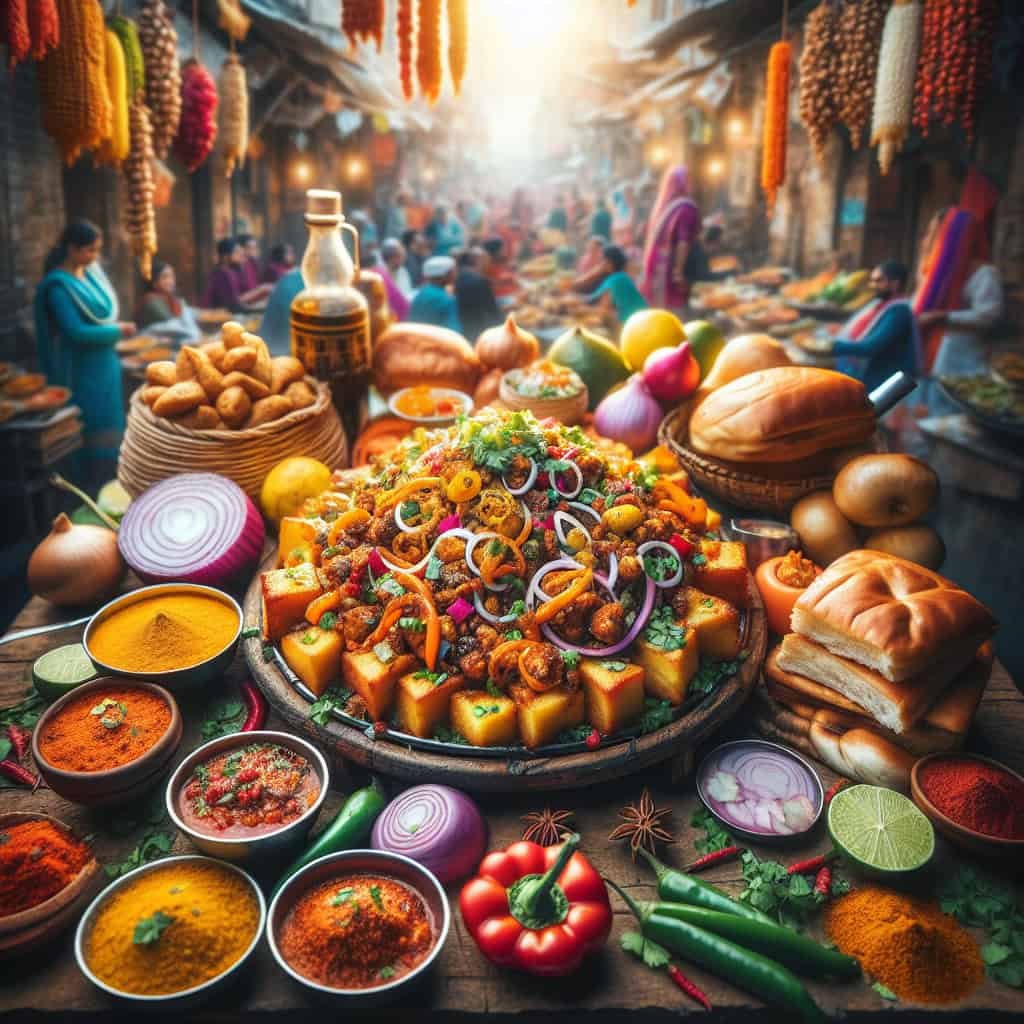Indulge in the flavors of the bustling Indian markets by sharing your unique take on a beloved street food recipe. Embark on a culinary adventure as you recreate the vibrant and tantalizing dishes that are synonymous with the vibrant streets of India. With an array of spices and ingredients at your disposal, unleash your creativity and create a dish that will transport your taste buds to the vibrant streets of this captivating country. Join us in celebrating the rich culinary heritage of India by sharing your own twist on these iconic street food recipes.

Introduction
If you’re a food lover, then you’re in for a treat! In this article, we’re going to take a deep dive into the world of Indian street food. From the variety of flavors to the rich culinary history, Indian street food is a culinary delight that will leave you craving for more. So buckle up and get ready to embark on a flavorful journey through the bustling markets of India!
About Indian Street Food
Variety of Flavors
One of the most remarkable aspects of Indian street food is the incredible array of flavors it offers. From spicy to sweet, tangy to savory, every bite is a burst of taste that will tantalize your taste buds. Whether you prefer the fiery heat of samosas or the cool sweetness of kulfi, Indian street food has something for everyone.
Rich Culinary History
Indian street food has a rich culinary history that dates back centuries. Each snack or dish has a story behind it, with influences from different regions of India. The culinary traditions have been passed down from generation to generation, resulting in a tapestry of flavors that reflects the diversity and cultural heritage of the country.
Popular Street Food Recipes
When it comes to popular Indian street food recipes, there are endless options to choose from. Some of the all-time favorites include crispy pakoras, flavorful chaat, and mouthwatering dosas. These dishes are not only delicious but also representative of the vibrant street food culture in India.
Understanding the Bustling Markets
Vibrant Atmosphere
One cannot talk about Indian street food without mentioning the vibrant atmosphere of the bustling markets. The streets are filled with the lively sounds of vendors calling out their specialties, the aroma of spices wafting through the air, and the constant hustle and bustle of people. It’s an experience that engages all your senses and leaves an indelible mark on your memory.
Local Vendors
At the heart of Indian street food are the local vendors who tirelessly serve up these delectable treats day in and day out. These vendors have honed their craft over years, perfecting the recipes and techniques that have been handed down through generations. They are the true heroes of the street food scene, bringing joy and flavor to the masses.
Unique Street Food Culture
What sets Indian street food apart is its unique street food culture. Street food has long been an integral part of Indian cuisine, with vendors setting up their stalls in every nook and cranny of the country. It’s not just about the food; it’s also about the sense of community and camaraderie that comes from sharing a meal with strangers on the streets.
The Beloved Indian Street Food Recipe
Introduction to the Recipe
Now, let’s delve into one of the most beloved Indian street food recipes – the iconic pav bhaji. This mouthwatering dish consists of a spiced vegetable curry served with buttery pav bread. It’s a favorite among locals and tourists alike, and it’s not hard to see why. The combination of flavors and textures is simply irresistible.
Ingredients
To make pav bhaji, you will need a variety of fresh vegetables such as potatoes, cauliflower, carrots, peas, and bell peppers. Other key ingredients include onions, tomatoes, ginger, garlic, and an array of spices like turmeric, chili powder, and garam masala. Of course, don’t forget the pav bread and butter to complete the dish.
Preparation Steps
To prepare pav bhaji, start by boiling and mashing the vegetables. Then, heat some oil in a pan and sauté onions and tomatoes until they turn soft. Add the mashed vegetables and spices to the pan, along with some water. Let it simmer for a while to allow the flavors to meld together. Finally, toast the pav bread with butter and serve it alongside the piping hot bhaji. Garnish with chopped onions, coriander leaves, and a squeeze of lemon juice for a burst of freshness.

Variations and Regional Specialties
Regional Variations
Just like the diverse culture and cuisines of India, street food recipes also vary from region to region. For example, vada pav, a popular street food from Mumbai, consists of a spicy potato fritter sandwiched between pav bread. In Kolkata, you’ll find pani puri, where crispy puris are filled with a tangy tamarind water and served with a medley of chutneys. Exploring the regional variations of Indian street food is like embarking on a culinary adventure across the country.
Different Fillings and Toppings
Even within a single dish, there are numerous possibilities for customization. For pav bhaji, you can experiment with different vegetables and spices to create your own unique version. Some people like to add extra toppings like grated cheese, chopped onions, or a dollop of butter for added richness. The possibilities are endless, so don’t be afraid to get creative!
Tips for Authentic Indian Street Food
Use Fresh Ingredients
To truly capture the essence of Indian street food, it’s important to use fresh and high-quality ingredients. The flavors of the spices and the vegetables shine through when they are at their peak freshness. Visit your local farmers’ market or specialty stores to source the best ingredients for your street food recipes.
Experiment with Spices
Indian cuisine is renowned for its bold and aromatic spices. Don’t be afraid to experiment with different spice blends and combinations to create your own unique flavors. From cumin and coriander to cardamom and cloves, each spice has its own distinctive character that can elevate your street food dishes to new heights.
Embrace the Messiness
One of the joys of Indian street food is its unapologetic messiness. Street food is often eaten on the go, with no time for formalities or cutlery. Embrace the mess and let your hands and taste buds be your guide. There’s something about getting your hands dirty and savoring the flavors with reckless abandon that adds to the overall experience.

Health and Safety Considerations
Hygiene Practices
When it comes to enjoying street food, it’s crucial to prioritize hygiene. Look for vendors who follow proper hygiene practices, such as wearing gloves, using clean utensils, and maintaining a clean cooking environment. Avoid street food stalls that appear unclean or have questionable food handling practices to minimize the risk of foodborne illnesses.
Choosing Trustworthy Vendors
While exploring the bustling markets, it’s important to choose trustworthy vendors who have a reputation for serving safe and delicious street food. Look for stalls that have a steady flow of customers, as that is usually a good indicator of the quality and taste of the food. Don’t be afraid to ask locals for recommendations or read reviews online to ensure you have a positive and memorable street food experience.
Sharing Your Take on the Recipe
Adding Personal Touches
While the pav bhaji recipe we discussed earlier is a classic, don’t hesitate to add your personal touches to make it truly your own. You can experiment with different vegetables, adjust the spice levels according to your preference, or even add a secret ingredient that adds a special twist to the dish. Let your creativity shine through and make it a reflection of your own culinary style.
Presentation Ideas
They say we eat with our eyes first, and that holds true for street food as well. Get creative with the presentation of your dish to make it visually enticing. Garnish it with fresh herbs, sprinkle some colorful spices on top, or serve it in a unique and eye-catching dish. Presentation is key when it comes to sharing your take on Indian street food.
Incorporating Local Ingredients
Whether you’re recreating a classic recipe or putting your spin on it, consider incorporating local ingredients to add a unique touch. Use locally sourced vegetables, spices, or even artisan breads to infuse a sense of place into your street food. It’s a great way to celebrate the flavors and ingredients from your own region.

Exploring the Culinary Heritage
Historical Significance
Indian street food not only tantalizes our taste buds but also has a deep historical significance. The culinary traditions and recipes have been passed down through generations, and each bite tells a story of the past. Exploring the culinary heritage of Indian street food is like taking a trip back in time and connecting with the rich cultural tapestry of the country.
Influence on Modern Indian Cuisine
Indian street food has had a profound influence on modern Indian cuisine. Many street food dishes have found their way into restaurants and kitchens across the country and even beyond its borders. The flavors, techniques, and ingredients used in street food have become an integral part of the contemporary Indian culinary scene, showcasing the evolution of Indian cuisine over the years.
Conclusion
Indian street food is not just about satisfying your hunger; it’s about immersing yourself in a vibrant culinary culture that has stood the test of time. From the variety of flavors to the bustling markets, every aspect of Indian street food is a celebration of taste, heritage, and community. So, grab a plate of your favorite street food, savor the flavors, and let your taste buds take you on a delightful journey through the bustling markets of India.

